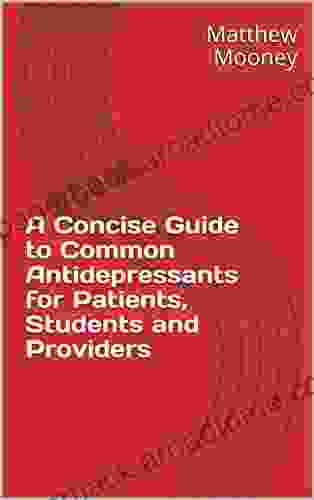Concise Guide To Common Antidepressants For Patients, Students, And Providers

Depression is a common mental health condition that affects millions of people worldwide. It can have a significant impact on a person's quality of life, affecting their mood, sleep, appetite, and energy levels. Antidepressants are a type of medication that is used to treat depression and other mental health conditions.
This guide provides a concise overview of common antidepressants, including their uses, side effects, and interactions. It is intended to be a resource for patients, students, and healthcare providers who are interested in learning more about these medications.
4.8 out of 5
| Language | : | English |
| File size | : | 819 KB |
| Text-to-Speech | : | Enabled |
| Screen Reader | : | Supported |
| Enhanced typesetting | : | Enabled |
| Print length | : | 34 pages |
| Lending | : | Enabled |
Types of Antidepressants
There are several different types of antidepressants, each with its own unique mechanism of action. The most common types of antidepressants include:
- Selective serotonin reuptake inhibitors (SSRIs): SSRIs are the most commonly prescribed type of antidepressant. They work by increasing the levels of serotonin in the brain. Serotonin is a neurotransmitter that is involved in mood regulation.
- Serotonin-norepinephrine reuptake inhibitors (SNRIs): SNRIs work by increasing the levels of serotonin and norepinephrine in the brain. Norepinephrine is a neurotransmitter that is involved in arousal and attention.
- Tricyclic antidepressants (TCAs): TCAs are an older type of antidepressant that work by blocking the reuptake of serotonin and norepinephrine. They are not as commonly prescribed as SSRIs or SNRIs due to their side effects.
- Monoamine oxidase inhibitors (MAOIs): MAOIs are an older type of antidepressant that work by blocking the breakdown of monoamines, which are neurotransmitters that are involved in mood regulation. They are not as commonly prescribed as SSRIs or SNRIs due to their side effects and interactions.
Uses of Antidepressants
Antidepressants are used to treat a variety of mental health conditions, including:
- Depression
- Anxiety
- Obsessive-compulsive disFree Download (OCD)
- Panic disFree Download
- Post-traumatic stress disFree Download (PTSD)
Antidepressants can be effective in reducing symptoms of depression and other mental health conditions. However, it is important to note that they are not a cure. Antidepressants can take several weeks to start working, and it is important to take them as prescribed in Free Download to achieve the best results.
Side Effects of Antidepressants
All medications have side effects, and antidepressants are no exception. The most common side effects of antidepressants include:
- Nausea
- Vomiting
- Diarrhea
- Constipation
- Headache
- Dizziness
- Insomnia
- Drowsiness
- Sexual side effects
Most side effects of antidepressants are mild and will go away within a few weeks. However, some side effects can be more serious. If you experience any side effects that are severe or that do not go away, it is important to talk to your doctor.
Interactions
Antidepressants can interact with other medications, including over-the-counter medications and herbal supplements. It is important to tell your doctor about all of the medications you are taking, including prescription drugs, over-the-counter drugs, and herbal supplements.
Some medications can increase the levels of antidepressants in the blood, which can lead to side effects. Other medications can decrease the levels of antidepressants in the blood, which can make them less effective.
It is important to follow your doctor's instructions carefully when taking antidepressants. Do not take more or less medication than prescribed, and do not stop taking the medication without talking to your doctor.
How to Choose an Antidepressant
The best antidepressant for you will depend on your individual needs and circumstances. Your doctor will consider a number of factors when choosing an antidepressant, including:
- Your symptoms
- Your medical history
- Your other medications
- Your lifestyle
It is important to be patient when starting an antidepressant. It can take several weeks to start working, and it may take some time to find the right medication and dosage for you. If you do not experience any improvement in your symptoms after a few weeks, talk to your doctor.
Antidepressants can be an effective treatment for depression and other mental health conditions. However, it is important to be aware of the potential side effects and interactions. Talk to your doctor about the risks and benefits of antidepressants before starting treatment.
If you are struggling with depression or another mental health condition, help is available. Talk to your doctor or a mental health professional about the best treatment options for you.
4.8 out of 5
| Language | : | English |
| File size | : | 819 KB |
| Text-to-Speech | : | Enabled |
| Screen Reader | : | Supported |
| Enhanced typesetting | : | Enabled |
| Print length | : | 34 pages |
| Lending | : | Enabled |
Do you want to contribute by writing guest posts on this blog?
Please contact us and send us a resume of previous articles that you have written.
Light bulbAdvertise smarter! Our strategic ad space ensures maximum exposure. Reserve your spot today!
 Floyd RichardsonFollow ·3.3k
Floyd RichardsonFollow ·3.3k Forrest ReedFollow ·17.5k
Forrest ReedFollow ·17.5k Gerald ParkerFollow ·14.1k
Gerald ParkerFollow ·14.1k Alvin BellFollow ·17.7k
Alvin BellFollow ·17.7k Alexander BlairFollow ·7k
Alexander BlairFollow ·7k DeShawn PowellFollow ·5.6k
DeShawn PowellFollow ·5.6k Holden BellFollow ·17.3k
Holden BellFollow ·17.3k Chase SimmonsFollow ·2.3k
Chase SimmonsFollow ·2.3k

 Isaiah Powell
Isaiah PowellWisconsin Clinic Pilots Mobile Crisis Response System For...
MADISON, Wis. - A new mobile crisis...

 Daniel Knight
Daniel KnightUnleash Your Creativity: A Masterclass in Fabulous Nail...
Embellish Your Fingertips with Captivating...

 Clark Campbell
Clark CampbellDetect When You Are Being Emotionally Manipulated By...
Emotional manipulation is a subtle but...

 Eli Brooks
Eli BrooksNeurological Disorders Papers: Dissociative Identity...
What is Dissociative...

 Ricky Bell
Ricky BellAn Introduction to Islam for Jews: Unveiling the Tapestry...
A Bridge of Understanding: Exploring Islam for...

 Octavio Paz
Octavio PazAchieving Longevity: The Complete Step-by-Step Guide to...
**** In the ever-evolving landscape of health...
4.8 out of 5
| Language | : | English |
| File size | : | 819 KB |
| Text-to-Speech | : | Enabled |
| Screen Reader | : | Supported |
| Enhanced typesetting | : | Enabled |
| Print length | : | 34 pages |
| Lending | : | Enabled |

















































